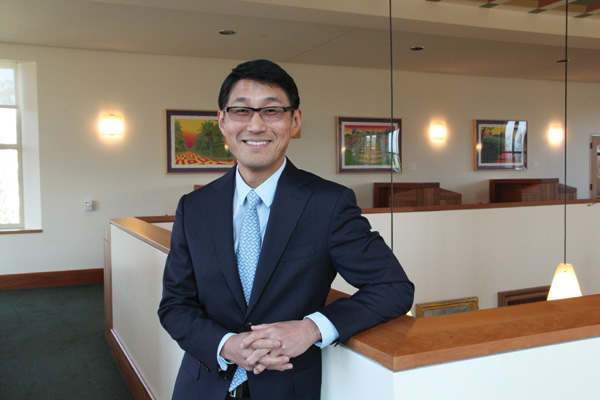story by KARIN CHAN
photography by CHRISTELLE NAHAS/UCLA
Gripping his suitcase handle for support, a young Jerry Kang froze in the center of Chicago’s O’Hare International Airport. As travelers brushed past him, he saw on a sign the name of his new home.
Chicago—one of the few words he knew in English. It had a nice ring to it. At age 6, Kang arrived in the U.S. from South Korea, his parents just one of many immigrants in search of the American Dream. They settled in the suburb of Skokie, Ill. Recognizing his parents toiled away in working class jobs and sacrificed much for him and his two older siblings, Kang knew the only way to repay his hard-working parents was to excel in school. He was a model son: high school valedictorian, Harvard undergrad who studied physics, Harvard Law student and first-generation working professional in his family.
Now, the lawyer-academic can add one more first to the list. On July 1, Kang becomes the inaugural vice chancellor of Equity, Diversity and Inclusion at the University of California, Los Angeles, where he will work to promote a more open and fair environment on campus.
Chancellor Gene Block created the position after a 2013 report commissioned by the school illuminated concerns from minority faculty members regarding discrimination and bias against faculty of color and the overall climate of diversity at UCLA.
In his new role, Kang, 48, plans to usher in reforms that will increase accountability in the administration and build trust among marginalized communities within the university and student body.
“As an immigrant, a racial minority and a first-generation college student, I know what it feels like to be an outsider,” Kang said in an interview with KoreAm at the law school.
The area of focus is familiar to Kang—he has long fostered a deep interest in race relations and has pursued a body of research into critical race studies that draws from principles of social and behavioral psychology.
After realizing that theoretical physics would not effect social change, Kang decided to pursue law after college. He’d become mindful of social injustices in the U.S. and noticed the lack of scholarship dealing with race and Asian Americans. In 1993, the year he graduated from law school, he wrote a note published in the Harvard Law Review analyzing racial violence against Asian Americans and the role stereotypes play in giving rise to such crimes. Kang knew this issue received less coverage in the mainstream media thanks to the “model minority myth” surrounding Asian Americans.

“I started to get more irritated by the fact that folks without a voice were being pushed around and treated like they didn’t matter,” Kang said. “This was my opportunity, as a student editor, to focus some legal attention on matters that mainstream society and even traditional civil rights constituencies largely ignored in the early 1990s.”
In 1995, just two years out of law school, Kang joined the faculty at the UCLA School of Law. He co-directed the school’s Critical Race Studies program for several years with Laura Gómez, now a longtime colleague and friend. “In appointing Jerry, Gene Block knew he was not getting a ‘yes man’—quite the opposite, he has selected someone who will tell it like it is,” Gómez told KoreAm by email.
Kang has conducted extensive research on the intersection of implicit bias and law. He has been invited to speak at bar associations, law firms and corporations—including delivering a TEDx talk in San Diego in 2013—about the phenomenon in which people are influenced by attitudes and stereotypes outside of their conscious control.
His research on affirmative action led to his co-writing an amicus brief with colleagues in Fisher v. University of Texas, the U.S. Supreme Court case challenging the school’s use of race in its undergraduate admissions process. The brief discussed “stereotype threat,” or the theory that students who fear their performance will be reflective of negative stereotypes about their minority group will perform worse as a result of stress and anxiety.
“Jerry’s law scholarship demonstrates his sensitivity to the histories and contemporary realities of people of color in the United States, as well as his ability to translate academic understandings of diversity into practical interventions,” Jinqi Ling, Asian American Studies department chair at UCLA, told KoreAm.
Kang, who has been married for 24 years to Sung Hui Kim, a fellow UCLA law professor with whom he has a teenage daughter, has long-range goals for his new post.
“I will pursue a proactive, research and development strategy that actively hunts for best practices on how to assess faculty, students and staff; invest in their human capital; and promote a learning environment that allows everyone an equal shot at flourishing,” he said.
Although Kang never envisioned himself as a full-time administrator at a large university, he is ready to tackle the new role, despite having to stop teaching and put his scholarship on hold. “I have always said that when the time comes, we must step up and represent who we are, what we’ve lived and what we know,” Kang said. “This was my time.”
___
This article was published in the June/July 2015 issue of KoreAm. Subscribe today! To purchase a single issue copy of the June/July issue, click the “Buy Now” button below. (U.S. customers only. Expect delivery in 5-7 business days).







